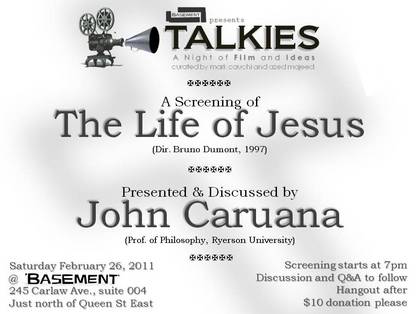La Vie de Jesus (The Life of Jesus) is Bruno Dumont’s impressive debut film. Released in 1997 to critical acclaim, the film powerfully conveys the moral and psychological nihilism of a group of young people in the northern French community of Bailleul. Amongst its other jarring features, viewers are confronted with the fact that the film’s title seems to bear virtually no relation to the narrative itself. Aside from one very brief reference to the resurrection of Lazarus, there is little to suggest that this film has anything to do with Jesus, let alone his life. Dumont’s film represents the first of a series of meditations on the pronounced absence of the divine in western post-industrial cultures. Unlike other contemporary atheists (Christopher Hitchens and Richard Dawkins, for example) Dumont -- a self-declared atheist -- is haunted by the collapse of the religious imaginary in Western European societies. La Vie de Jesus invites viewers to ponder the genuine challenge posed by the ‘death of God.’ In the face of resignation and nihilism, Dumont asks us to seriously consider the possibility of what he calls “spiritual atheism,” that is, spirituality outside the confines of institutional religion. In this way, Dumont’s provocative cinema intersects with the concerns of several contemporary European philosophers, including, Jacques Derrida, Julia Kristeva, and Gianni Vattimo. Like Dumont, these philosophers appreciate and acknowledge some of the profound issues that have emerged as a result of the vacuum that has opened up with the demise of traditional religion.
JOHN CARUANA is currently Associate Professor of Philosophy at Ryerson University. He also teaches in the Arts and Contemporary Studies program, as well as the Graduate Programme in Communication and Culture (York and Ryerson). His research interests include European philosophy of religion, philosophy of film, and psychoanalysis. He has published articles and chapters on the work of Theodor Adorno, Sigmund Freud, and Emmanuel Levinas, as well as the cinema of Krzysztof Kieslowski, Abbas Kiarostami, and Eric Rohmer.
JOHN CARUANA is currently Associate Professor of Philosophy at Ryerson University. He also teaches in the Arts and Contemporary Studies program, as well as the Graduate Programme in Communication and Culture (York and Ryerson). His research interests include European philosophy of religion, philosophy of film, and psychoanalysis. He has published articles and chapters on the work of Theodor Adorno, Sigmund Freud, and Emmanuel Levinas, as well as the cinema of Krzysztof Kieslowski, Abbas Kiarostami, and Eric Rohmer.

